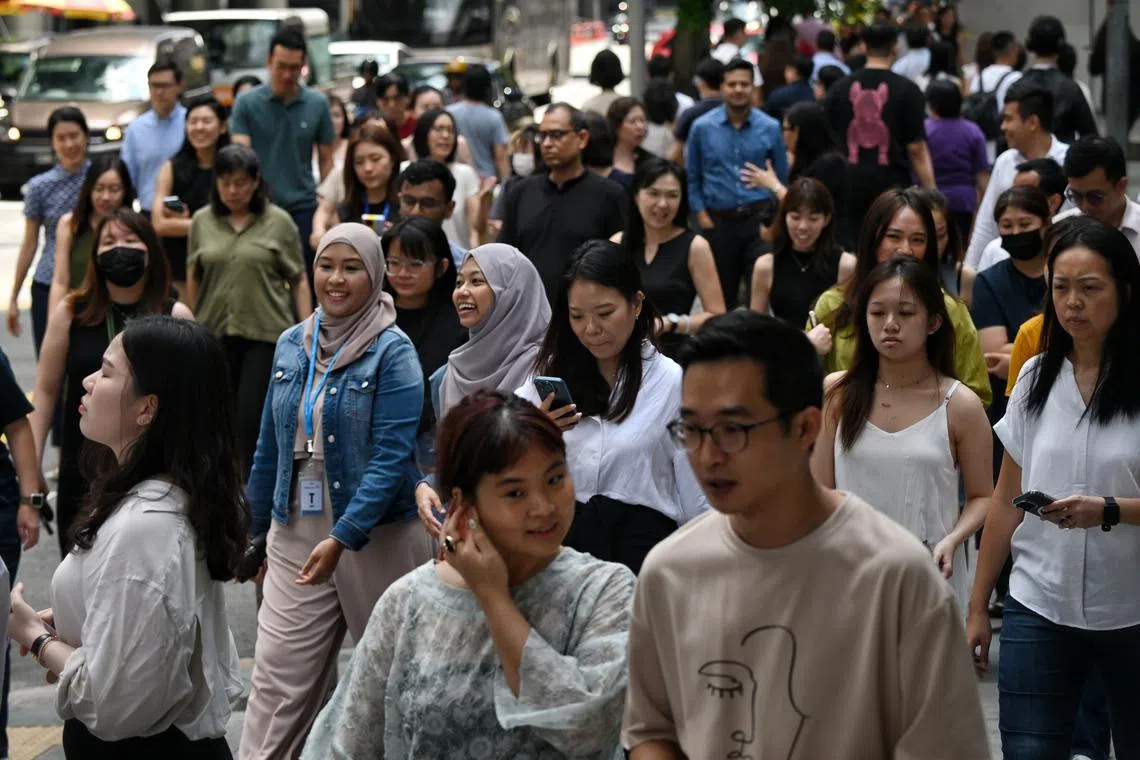New one-stop resource for S’pore employers looking to redesign jobs amid disruption, competition
Sign up now: Get ST's newsletters delivered to your inbox

Job redesign means restructuring work tasks and responsibilities to optimise processes and allocation of workers.
ST PHOTO: KUA CHEE SIONG
Follow topic:
SINGAPORE – Companies in Singapore seeking to redesign their jobs to cope with disruption and competition can tap resources online through a new one-stop resource.
Minister for Manpower Tan See Leng announced on Wednesday the launch of the Job Redesign Centre of Excellence by Workforce Singapore (WSG) and the Institute for Human Resource Professionals (IHRP), to help the Republic’s workplaces remain relevant and competitive.
Job redesign means restructuring work tasks and responsibilities to optimise processes and allocation of workers.
“In today’s hyper-competitive environment, businesses must adapt quickly to succeed,” said Dr Tan, speaking at a conference for human resources (HR) professionals. “Having a team ready to ride the waves of change will be a firm’s key competitive advantage.”
“To this end, HR professionals must re-imagine the future of work and unpack the impact of external trends on your organisations,” Dr Tan added. “This includes shaping the organisation’s workforce strategies to foster sustainable growth and innovation, and to adapt to the evolving nature of work.”
The centre, which can be accessed via IHRP’s website, will serve as a one-stop touchpoint providing industry-relevant expertise and resources for enterprises to transform their business and workforce through job redesign.
It will be managed by IHRP, which will reach out to companies through engaging trade associations and chambers (TACs) and HR professionals. More than 20 TACs representing 14 industry sectors have pledged their support.
Under the initiative, IHRP will develop resources to help enterprises adopt job redesign, including step-by-step sectoral playbooks and capability development workshops.
An expert panel that includes academics, HR and legal professionals as well as leaders from the Government, unions and business community will also share success stories of job redesign and provide guidance on available capability development initiatives firms can tap, among other things.
Ms Dilys Boey, WSG’s chief executive, said: “Human capital is the cornerstone of a successful enterprise transformation... Through job redesign, enterprises can make jobs more productive and also build up employees’ employment resilience to help them stay current, while enhancing their overall career health.”
In his speech, Dr Tan cited local telco Singtel as an example of a company that has transformed jobs for more than 2,500 employees and tapped WSG’s Productivity Solutions Grant for Job Redesign.
“Today, if you were to contact Singtel’s customer service, you might be interacting with a care adviser... Compared with the old role of a customer care officer, a Singtel care adviser now has an expanded portfolio and more advanced skill sets,” he said.
The care advisers now have the relevant digital skills to manage multiple products and to perform more complex tasks while delivering better customer experience.
Singtel has also reviewed its pay packages and introduced a structured career progression pathway, leading to more productive and engaged employees, said the minister.
Ms Angel Chua, 42, a cyber sales specialist at Singtel, said: “Upskilling has helped me ensure that I stay relevant and be even more effective in a dynamic industry, so that I can better support my customers’ needs and ensure that their business objectives are met.”
Alongside ensuring the relevance of workers, employers also need to attract and retain a wider talent pool as Singapore’s resident workforce gets older, yet more educated, and as competition in the labour market intensifies.
Dr Tan said that an Alliance for Action on Widening Access to Talent has been formed to address this need. The group will bring together businesses and HR leaders to develop strategies employers can use.
It aims to come up with scalable initiatives that will help companies to use hiring practices focused on skills to leverage transferable skills and experience of workers in adjacent jobs.
It will also look to promote skills-based workforce development practices so that workers can move through jobs and gain experience within their firms.
These initiatives will be piloted in three sectors – manufacturing, information and communication technology (ICT) and retail.
Dr Tan said it may seem counterintuitive for companies to help their employees pursue new opportunities, but it is not.
“Even if you do not offer your employees opportunities, other companies will offer them, and your employees may eventually end up seeking opportunities with these other companies.”
The alliance will run for six months from January 2024, and is supported by the Ministry of Manpower, Singapore National Employers Federation (SNEF) and National Trades Union Congress.
It will be co-led by Dr Bicky Bhangu, president of South-east Asia, Pacific and South Korea at Rolls-Royce and an SNEF council member, and Ms Aileen Tan, group chief people and sustainability officer at Singtel and an IHRP Master Professional. Other members will include leaders from businesses and TACs.
Dr Bicky said: “To meet the fast-evolving needs of the economy and workplace, there has to be a shift towards assessment and hiring of workers beyond relying solely on qualifications or past work experiences.”
Ms Tan added that HR practitioners in the group will explore the use of jobs-skills data in helping organisations better assess their “skills inventory” and make data-driven decisions on reskilling, training and career development for employees.
The new resource and alliance were announced at IHRP’s People Behind People Forum 2023, held at the Sands Expo and Convention Centre.
The forum, which is now in its fourth year, hosted more than 600 delegates representing over 80 organisations.


